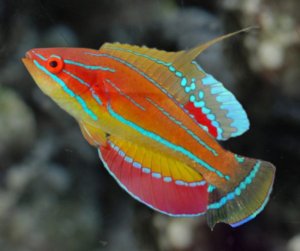
When it comes to wrasse, their lifespan can vary significantly based on species, environment, and care. Some wrasse can live a few years, while others can thrive for over a decade in a well-maintained aquarium. It’s fascinating how a little fish can have such a large impact on your tank’s ecosystem and how long they can add joy to your underwater world. So, let’s take a closer look at the lifespan of wrasse, what affects it, and how you can ensure your wrasse lives a happy, long life in your aquarium.
Understanding Wrasse Species
Wrasse is a term that encompasses a wide range of species, each with its unique characteristics and needs. Some common types include the Cleaner Wrasse, Lunar Wrasse, and Eight-Line Wrasse. These species can vary in size, behavior, and dietary habits. For instance, the Cleaner Wrasse is known for its important role in cleaning parasites off other fish, while the Lunar Wrasse is famous for its striking colors and playful demeanor.
When we talk about lifespan, it’s essential to consider the specific species you’re interested in. Some wrasse species can live up to 10 years or more in captivity, while others might only see a few years. For example, the Yellow Wrasse typically lives around 5 to 6 years, but with the right care, it can reach its full potential. So, understanding the species you’re dealing with is key to planning for its needs and longevity.
Factors Influencing Lifespan
Just like us humans, wrasse have their own set of needs that can affect how long they live. Here are some crucial factors to consider:
- Water Quality: Clean, stable water is vital. Poor water conditions can lead to stress and shorten lifespan.
- Diet: A balanced diet rich in vitamins, minerals, and appropriate food types can help boost their immune system.
- Tank Size: Wrasse need space to swim and explore. A cramped environment can lead to stress and health issues.
- Tank Mates: Compatibility with other fish is important. Aggressive tank mates can cause stress, affecting their wellbeing.
Ensuring all these factors are met can mean the difference between a short life and a long, fulfilling one for your wrasse. Each aspect contributes to how well your fish adapts, eats, and interacts with its surroundings, ultimately impacting its lifespan.
How to Care for Your Wrasse
If you want your wrasse to thrive, you’ll need to create a comfortable and enriching environment. Here are some essential care tips:
1. Maintain Stable Water Conditions: Regularly check your water parameters, such as temperature, salinity, and pH levels. Wrasse generally prefer temperatures between 75°F to 80°F.
2. Feed a Varied Diet: Opt for high-quality marine flakes, pellets, and occasional treats, like live or frozen food. A varied diet not only ensures good health but also mimics their natural feeding habits.
3. Provide Hiding Spots: Wrasse are curious and need places to hide. Include rocks, caves, or coral in your tank layout. This not only gives them security but also encourages natural behaviors.
4. Regular Monitoring: Keep an eye on your fish for any changes in behavior or health. Early detection of issues can help you address problems before they escalate.
By following these guidelines, you can significantly enhance the chances of your wrasse living a long, happy life.
Common Health Issues
Even with the best care, wrasse can sometimes face health challenges. Here are a few common issues and how to deal with them:
– Ich (White Spot Disease): This is a common parasite that can affect many fish. You might notice tiny white spots and behavior changes, like rubbing against objects. Treating ich early with appropriate medications is crucial.
– Fin Rot: If you see frayed fins or discoloration, it could be a sign of a bacterial infection, often caused by poor water quality. Ensure you maintain clean conditions and consider treating with medicated food or medications.
– Stress: Signs of stress in wrasse can include hiding, lethargy, or loss of appetite. Stress can be caused by incompatible tank mates, sudden changes in water quality, or overcrowding. Identifying the source of stress is essential for recovery.
Recognizing these issues early can help you take action and keep your wrasse healthy.
Comparing Lifespan in the Wild vs. Captivity
You might be curious about how wrasse fare in the wild compared to captivity. In general, wrasse tend to live longer in well-maintained aquariums than in the wild. In the wild, they face numerous threats like predators, diseases, and environmental changes.
In captivity, if properly cared for, wrasse can often live longer due to controlled conditions. However, if the aquarium environment isn’t optimal, their lifespan can suffer. For example, a Cleaner Wrasse might live up to 20 years in a well-managed tank but only 5-10 years in the wild due to constant threats.
This highlights how crucial dedicated care is to help your wrasse reach its potential lifespan.
Ultimately, how long wrasse live in your aquarium mostly depends on the care you provide. By understanding their specific needs and creating a stable, enriching environment, you’re giving your wrasse the best chance at a long, vibrant life. These fish not only add color and movement to your aquarium but also bring a sense of joy and curiosity, enriching your aquatic experience.
So if you’re ready to take the plunge and welcome a wrasse into your home, remember that your attentiveness and care can make all the difference in their lifespan and overall happiness. With the right setup and love, your wrasse can thrive for years, making your underwater world all the more magical.
